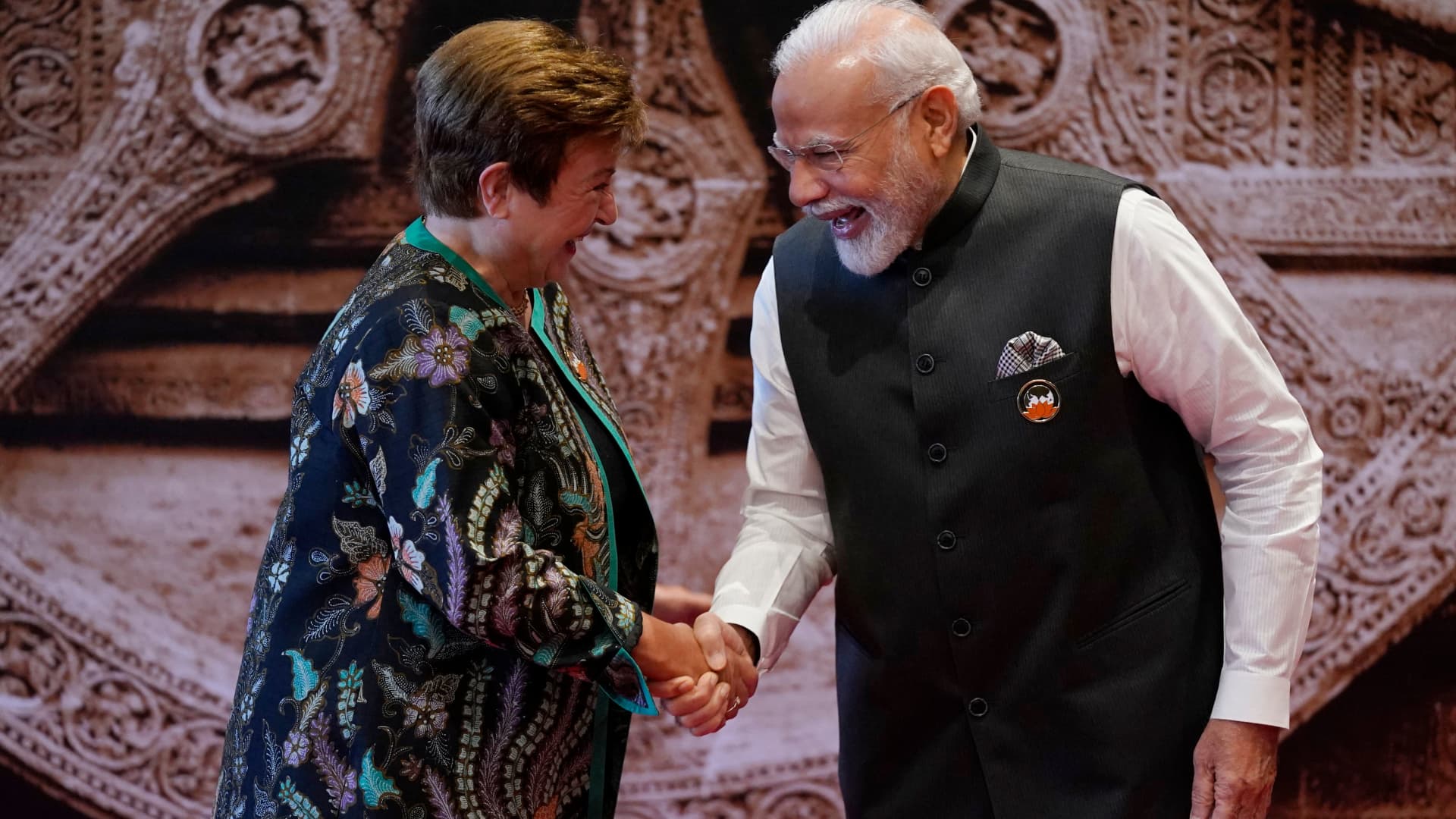
NEW DELHI — The Biden-led rail-to-sea economic corridor linking India with Middle Eastern and European countries should not be exclusionary and should engage in the spirit of an integrated world economy, according to the International Monetary Fund’s Managing Director Kristalina Georgieva.
At a time when supply chains are aligning along shifting global geopolitical lines, U.S. President Joe Biden’s initiative appears to be aimed at not only countering China’s influence in the energy-rich Middle East, but also Beijing’s decade-old Belt and Road global infrastructure initiative. A more fragmented global economy though, has limited global trade growth — which now lags global economic growth.
“If we want trade to be an engine of growth, then we have to create corridors and opportunities,” Georgieva told CNBC’s Martin Soong Sunday on the sidelines of the Group of 20 nations leaders’ summit in New Delhi.
“What is important is to do it for the benefit of everybody, and not for exclusion of others,” she said. “In that sense, I would encourage all countries working collaboratively with each other to do so in the spirit of integrated economy.”
At the leaders’ summit Saturday, Biden and Indian Prime Minister Narendra Modi announced a plan to develop a network of railways and sea routes that will connect India, the European Union and Middle Eastern countries such as Israel, Jordan, Saudi Arabia and the United Arab Emirates in “a transformative regional investment.”
The deal underscores not only the burgeoning partnership between India and U.S., but also their urgency and resolve in persuading the world they represent a more viable strategic proposition in facilitating the developmental needs of the Global South.
Virtuous cycle
In reality, this Biden-backed economic corridor would add to existing infrastructure investment for the regions involved. The countries involved will meet within the next two months to develop and commit to an action plan with relevant timetables, which are all lacking at this point.
“In a world where we learned from Covid and the [Ukraine] war, that supply chains need to be reinforced, they need to be diversified, that connectivity matters tremendously,” Georgieva told CNBC in the exclusive interview.
“The more there is investment in infrastructure connectivity, the more there is a platform for trade among nations, the better for the countries involved, but also for the world economy because expansion of transportation links, communication links and trade have positive spillovers,” she added.
Her comments came at the end of the summit, where fierce Russian and Chinese opposition to references to the lingering war in Ukraine had almost derailed consensus on a joint communique that typically binds G20 member states.
In the Delhi Declaration that was eventually adopted Saturday, G20 nations pledged to protect the most vulnerable in the world by promoting equitable growth and enhancing macroeconomic and financial stability. Under Modi, India’s year-long presidency of the multilateral bloc of the world’s largest economies was focused on elevating the place of the Global South on the G20 agenda.
IMF quota review
Multilateral bank reform was among the issues on the agenda, which included establishing a global framework to restructure sovereign debt, particularly for vulnerable developing economies.
The IMF warned the the economic recovery after a series of major shocks is slow and uneven, with growth prospects in the medium term at its weakest in decades in an environment of stubbornly high inflation, high interest rates and growing fragmentation.
“And I call on our members to strengthen the global financial safety net,” Georgieva separately said Sunday in a press release, released shortly after the G20 summit formally ended.
“Since the start of the pandemic, the IMF has injected $1 trillion in reserves and liquidity through lending to nearly 100 countries and the historic [Global Sovereign Debt Roundtable] allocation; and I thank our members who have helped us reach the goal of channeling $100 billion to vulnerable countries,” she added.
The IMF is undergoing its 16th quota review that is scheduled to wrap up by year-end. The Fund conducts these reviews once every five years to assess its ability to meet the needs of member states’ balance of payments financing needs, and to adjust members’ quota to reflect changes in their relative positions in the world economy.
“To make the global economy stronger and more resilient in a more shock-prone world, it is vital to reach an agreement to increase the IMF’s quota resources before the end of the year and secure the needed resources for the Fund’s interest-free support to the poorest countries through the Poverty Reduction and Growth Trust,” Georgieva added in the statement.
By CNBC
